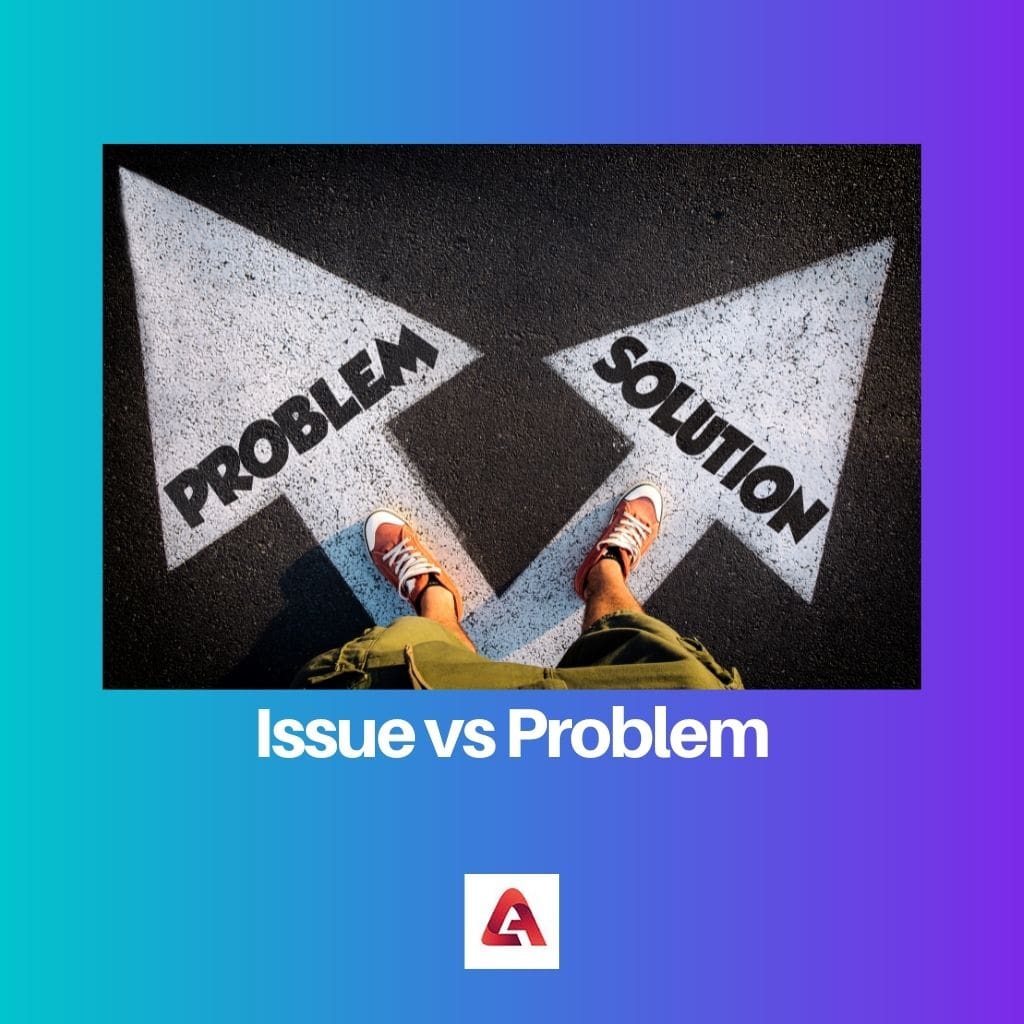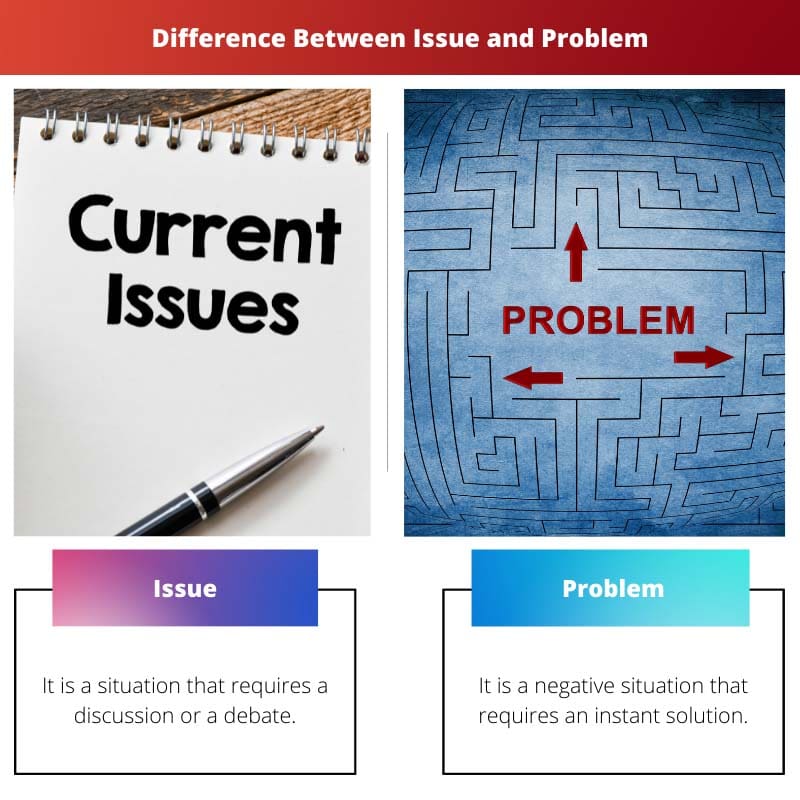An issue or a problem are two words mistaken for the same meaning. This happens because both of these words point towards testing or challenging situations.
A problem and an issue are the certainties that matter; they must be given the required attention and solved.
Key Takeaways
- Issues are concerns or topics that require attention, discussion, or resolution; problems are situations or obstacles that impede progress or cause difficulty.
- Issues can be abstract or conceptual, requiring exploration and discussion; problems are concrete and tangible, requiring a solution or action.
- Issues can be identified through dialogue, research, or observation; problems require analysis or investigation to identify their root causes.
Issue vs. Problem
An issue is a situation that can be handled easily. It did not affect the lives of people. An issue can be resolved with discussion. The problem is a situation that needs to be solved as soon as possible. It can affect the lives of people. Action needs to be taken to solve the problem. It always has a negative impact.

An issue is a situation that asks for a discussion or a debate. This situation arises due to a particular topic on which different people might have different views.
An issue can be continued for a long time, but it does not alter your life. However, it might create a little annoyance at first.
Conversely, a problem is a negative situation that requires an instant solution or might grow even more damaging. A problem, if not solved on time, can alter your life.
It not only affects you but also the people around you.
Comparison Table
| Parameters of Comparison | Issue | Problem |
|---|---|---|
| Definition | It is a situation that requires a discussion or a debate | It is a negative situation that requires an instant solution |
| Usage | It is comparatively used more. | It is used less because most the people solve the situation with discussion before it becomes a problem. |
| Solutions | Discussion and debate. | Instant decision, but it should be given a lot of thought. |
| Impacts | It impacts both positively and negatively hence it has neutral impacts. | This has only one impact, and that is negative. |
| Outcomes | Not life-altering, mostly solved or forgotten. | Life-altering can create harsh and bad feelings between people and ruin their relationships. |
What is Issue?
An issue is an unsettled controversy that requires a discussion, something that is debatable or has many different points of view. It has a neutral nature, i.e., it can have a negative and a positive impact.
Depending on this factor, an issue can lead to a healthy discussion, but at the same time, it can lead to an unhealthy discussion, which might create some annoyance between people.
An issue can have different meanings and outlooks for different people; it can be a good thing for one and bad for others, leading to its controversial nature.
An issue is a small situation with no life-altering effects. However, a discussion on a particular issue can be continued for a long time.
But after some time, the issue does not remain the same. Either it becomes something severe to people, and other times; it does not even matter.

What is problem?
Whenever you hear the word “problem,” you immediately think about the word ” solution.” A problem refers to a negative and unwelcome situation that must be dealt with immediately.
A problem leads to harsh and bad feelings in a relationship. It can alter your life either permanently or temporarily because it might create annoyance in case of finding a solution.
A problem affects a particular person, and the people around them get dragged into it even if they are not related to that problem. It is a more significant situation that requires a fair amount of thinking to find the right solution.
A problem cannot continue for a long time, or it can become severe and negatively affect a person’s life. It can also affect their relationships with other people.
A problem negatively affects a topic, becoming a barrier to success.

Main Differences Between Issue and Problem
- An issue is a situation that needs a discussion or a debate, whereas a problem requires an urgent solution.
- An issue has little or no impact, whereas a problem can significantly affect people.
- An issue is not life-altering. It does not create any other serious situations. While a problem is life-altering, it can create bad conditions in the relationship with other people and can cause some harm in other situations that a person might have.
- An issue can continue for a long time but loses its essence with that time. It does not remain the same as it was in the beginning. At the same time, a problem can not continue for a long time because, in that case, it can become even more severe.
- An issue is not a barrier to success, whereas a problem is.
- An issue is neutral, i.e., it can have a good and lousy impact. It is different for different people. In contrast, a problem only has a negative effect.

- https://www.jstor.org/stable/23317338
- https://www.tandfonline.com/doi/abs/10.3109/00365513.2012.681935

The distinction between issues and problems provides clarity on when immediate action is necessary, and when discussion and dialogue suffice for resolution.
Well said, Rob, the discernment brings a greater understanding of when to act promptly and when to delve into dialogue.
Absolutely, it’s about recognizing the urgency and impact of the situation at hand, which the article articulates well.
The detailed comparison table effectively highlights the key differences between an issue and a problem.
Absolutely, the table provides a clear breakdown of the distinctions, making it easier to comprehend.
I appreciate the clear comparison between ‘issue’ and ‘problem’, it helps to understand the differences better.
I agree, it’s important to distinguish between the two and understand their impacts.
The definitions of ‘issue’ and ‘problem’ elucidate their distinctions, fostering a stronger comprehension of their respective implications.
Absolutely, the definitions serve as foundational knowledge for addressing various situations with precision.
Certainly, the clarity provided by the definitions enhances our ability to navigate between issues and problems more effectively.
The detailed examination of what constitutes an issue and a problem is highly informative and thought-provoking.
I couldn’t agree more, the discussion around these concepts provides valuable insights.
Indeed, it’s essential to consider the nuances of each, and this article does so admirably.
The article eloquently elaborates on the nature of ‘issue’ versus ‘problem’, providing a comprehensive overview.
Absolutely, the thorough examination enriches our understanding of these critical concepts.
Agreed, the detailed analysis enhances our ability to discern between various situations effectively.
I’m not sure if issues can always be handled easily, this seems to simplify the depth of some issues people can face.
I see where you’re coming from, Ruby, some issues are indeed very complex and not easily resolved.
I agree with you Ruby. Some issues can have a lasting impact and can’t be simply forgotten or ignored.
I appreciate the emphasis on the negative impact of problems, it’s an important factor to consider.
Definitely, the lasting impact of problems on individuals and their relationships is crucial to note.
Agreed, the consequences of problems can be severe and far-reaching.
The comparison of how issues and problems can affect individuals and relationships adds depth to the understanding of these terms.
Absolutely, understanding the broader implications of these concepts is crucial for effective problem-solving.
The article provides a well-structured comparison and analysis of what constitutes an issue versus a problem.
Absolutely, the thorough exploration of the differences is helpful in distinguishing between the two.